2010年山东青岛大学基础英语(2)考研真题
Part I. Vocabulary and Structure (20 points)
Directions: choose one of the four answers that best completes the sentence.
1. Why does a vegetarian restaurant make its dishes resemble meat in every
way except
A. ingredient
B. elements
C. components
D. compounds
?
2. It was felt that he lacked the
to pursue a difficult task to
the very end.
A. petition
B. engagement
C. commitment
D. qualification
3. Retail sales volume in local urban and rural areas rose 57.8 percent and
46.8 percent,
, over February 1995,
A. individually
B. accordingly
C. correspodingly
D. respectively
4. Children in the United States are exposed to many influences those
of their families.
A. more than
B. other than
C. rather than
D. better than
5. You really haven’t
the old system.
A. duplicated
B. resembled
C. imitated
D. simulated
6.
should any money be given to a small child.
A. On no account
B. Of no account
C. From all account
D. By all account
7. Michael found it difficult to get his British jokes
to American
audiences..
1
�
A. around
B. over
C. across
D. down
8. If we believe something is good and true we should
to it.
A. hold up
B. keep on
C. hold on
D. keep up
9. With prices
so much, it’s hard for the company to plan a budget.
A. fluctuating
B. waving
C. swinging
D. vibrating
10. The storm sweeping over this area now is sure to cause
of vegetables in the coming days.
A. rarity
B. scarcity
C. invalidity
D. variety
11. I
with thanks the help of my colleagues in the preparation of
this new column.
A. express
B. confess
C. verify
D. acknowledge
12. It was a bold idea to build a power station in the deep valley, but it
as well as we had hoped..
A. came off
B. went off
C. brought out
D. made out
13. The vocabulary and grammatical differences between British and American
English are so trivial and few as hardly .
A. noticed
B. to be noticed
C. being noticed
D. to notice
14. I apologize if I
you, but I assure you it was unintentional.
A. offend
B. might have offended
2
�
C. had offended
D. should have offended
15. These causes produced the great change in the country that modernized
the
of higher education from the mid-1860’s to the mid-1880’s.
A. branch
B. category
C. domain
D. scope
16. Tom’s mother tried hard to persuade him to
from his intention
to invest his savings in stock market.
A. pull out
B. give up
C. draw in
D. back down
17. It wasn’t so much that I disliked her
that I just wasn’t
interested in the whole business.
A. rather
B. so
C. than
D. as
18. France’s
of nuclear testing in the South Pacific last month
triggered political debates and mass demonstrations.
A. assumption
B. consumption
C. presumption
D. resumption
19. The American society is
an exceedingly shaky foundation of
natural resources, which is connected with the possibility of a worsening
environment.
A. established on
B. affiliated to
C. originated from
D. incorporated with
20. My favorite radio song is the one I first heard on a thick 1923 Edison
disc I
at a garage sale.
A. trifled with
B. scraped through
C. stumbled upon
D. thirsted for
Part II. Cloze (20 points)
3
�
Directions: there are fifteen blanks in the following passage. For each
blank there are four choices marked A, B, C and D. You must choose the
ONE that best fits into the passage.
Increased growth of acquisition by our largest corporations has resulted
in a situation where the American economy will be
(1)
by virtually independent economic giants. Growth of these vast
accompanied by an increase in
corporatestructures, (2)
(3)
operate
under
their
of much smaller and less (4) companies that
control,
(5)
the
creation
of
monopoly-like structures (6)
American business.
(7)
, the major acquisitions by the sample companies are
corporate
are
(8)
profitable
successful
acquisition. The main (10)
and
that
(9)
acquisition was to
(11)
control and management of an
of the merger or
already (12)
which provide a (14)
enterprise to a new group, (13)
of management performance, for some of the (15)
acquired companies for the year immediately (16)
ratios,
(18)
less (20)
acquisition (17)
compared to the years after acquisition,
that, in most (19) the acquired companies operated
after acquisition.
A.
subdivided
B.
dominated
C. strengthened
D.
identified
B. if only
C. as though
D. even though
B. size
C. number
D. scope
B. beneficial
C. sturdy
B. hinders
B. throughout
C. donates
C. concerning
D. regarding
B. In practice
C. In general
D. In
D. thriving
D. foretells
1.
2.
3.
4.
5.
6.
7.
8.
A. only if
A. scale
A. powerful
A. signifies
A. through
A. In addition
particular
A. organizations
B. institutions
C associations
D.
constructions
A. after
9.
10. A. sequence
11. A. reform
12. A. bankrupt
13.
Productivity
14. A. limit
15. A. smaller
B. before
C. since
D. during
B. outline
C. progress
B. combine
C. transfer
D. effect
D. proclaim
B. successful
C. established
D. cooperated
A. Profitability
D. predictability
B. probability
C.
b. guidance
B. lesser
C. measure
C. miner
D. obstacle
D. major
4
�
16. A. preceding
17. A. which
18. A. witness
19. A. conditions
20. A. dependently
B. when
C. though
D. until
B. proceeding
C. exceeding
D. conceding
B. indicate
C. reveal
D. assert
B. examples
B. prominently
C. instances
C. efficiently
D. instants
D. sufficiently
III.Error Correction (10
points)
Directions: the passage contains TEN errors. Each indicated line contains a
maximum
of ONE error. In each case, only ONE word is involved. You should proofread
the passage and correct it in a right way.
For a wrong word, underline the wrong word and write the correct one in the
blank provided at the end of the line
For a missing word, mark the position of the missing word with a “∧ ” sign
and write the word you believe to be missing in the blank provided at the
end of the line.
For an unnecessary word, cross out the unnecessary word with a slash
“/ ” and put the word in the blank provided at the end of the line.
Whatever may be said against mass circulation magazines and newspapers,
it can hardly be argued that they are out of touch with their readers’
daydreams, and therefore the inducements they hold out to it must (1)
be a near accurate reflection of their unfulfilling wants and
aspirations.(2)
Study these and you will assuredly understand a good deal of what it is
that makes society tick.
Looking forward, for example, to the twenties and thirties, we can see
(3)
that circulation managers unerring diagnosed the twin obsessions which (4)
dominated that era of mass unemployment – economic insecurity and a
passion concern for the next generation. Thus it was that readers were (5)
recruited for offers of free insurance policies for the one, and free
instant (6)
education for the other. The family whose breadwinner lost an eye in a
double railway derailment, or an arm in a flood, could confidently expect
to collect several hundred pounds from the Daily This and the (7)
Evening That. The family who could not afford to send their son to grammar
school could find consolation equipping him with the complete works of (8)
5
�
Shakespeare in one magnificent, easy to read volume.
After the war the need to fall into step with the new consumers society
(9)
was soon realized. If you were flanked by neighbors who, dislike you,
could (10)
afford a holiday abroad, then winning an easy competition could set you up
with a fortnight in an exotic sunspot. Dishwashers, washing machines, and
slow-cookers were – and still are – available by the same means.
IV.Please read the following passages and choose one of the four answers
that best completes the sentence.( 10 points )
1. To a professional critic (I have been one myself)
theatre-going is the curse of Adam . The play is the evil he is paid to
endure in the sweat of his brow, and the sooner it is over, the
better . This would seem to place him in irreconcilable opposition to the
paying playgoer , from whose point of view the longer the play, the more
entertainment he gets for his money . It does in fact so place him ,
especially in the provinces, where the playgoer goes to the theatre for
the sake of the play solely, and insists so
effective],y on a certain number of hours' entertainment that touring
managers are sometimes seriously embarrassed by the brevity of the London
plays they have to deal in.
Both the professional critic and the paying playgoer
a. have the same attitudes towards the play.
b. have different attitudes towards the play.
c. like the play.
d. dislike the play.
2. For in London the critics are reinforced by a considerable body of
persons who go to the theatre as many others go to church, to display their
best clothes and compare them with others other people’ s;to be in the
fashion , and have something to talk about at dinner parties to adore a
pet performer’to pass the evening anywhere rather than at home:in short,
for any or every reason except interest in dramatic an as such.
According to the passage,
a.a considerable body of persons like to be in the fashion.
b.a considerable body of persons like to go to church. c.the
critics are out of fasion.
d.a considerable body of persons are in fasion.
3. In fashionable centres the number of irreligious people who go to
church , of unmusical people who go to concerts and operas, and of
undramatic people who go to the theatre, is so prodigious that sermons
have been cut down to ten minutes and plays to two hours ; and , even
at that, congregations sit longing for the benediction and audiences for
the final curtain , so that they may get away to the lunch or supper they
really crave for, after arriving as 1ate as(or 1ater than)the hour of
6
�
beginning
can
possibly
be
made
for
the
to
According
them .
passage,
a.they really crave for concerts.
b.they really crave for church .
c.they really crave for operas.
d.they really crave for meals.
4. Thus from the stalls and in the Press an atmosphere of hypocrisy
spreads.Nobody says straight out that genuine drama is a tedious
nuisance,and that to ask people to endure more than two hours of it(with
two long intervals of relief)is an intolerable imposition. Actually people
are
a. hypocritical.
b. straight out.
c. tedious.
d. a nuisance.
5. Let us , I say , be agreed about the meaning of the terms we are
using.I talk of knowing the best which has been thought and uttered in
the
knowing
literature.Literature is a 1arge world;it may mean everything written
with letters or printed in a book.
world ;
Professor
Huxley
means
says
this
Do you think
a.the author agrees with Professor Huxley about literature?
b. the author disagrees with Professor Huxley about literature?
c.the author partly agrees with Professor Huxley about literature?
d.the author can agree with Professor Huxley about literature?
V.(1)Translate the following from English into Chinese(20 points)
Casting my eyes despairingly around, I became gradually aware
that our position was by no means hopeless, inasmuch as the stern of the
ship containing our cabin was jammed between two high rocks, and was partly
raised from among the breakers which dashed the fore-part to pieces. As
the clouds of mist and rain drove past, I could make out, through rents in
the vaporous curtain, a line of rocky coast, and, rugged as it was, my
heart bounded towards it as a sign of help in the hour of need. Yet the
sense of our lonely and forsaken condition weighed heavily upon me as I
returned to my family, constraining myself to say with a smile, ‘Courage,
dear ones! Although our good ship will never sail more, she is so placed
that our cabin will remain above water, and tomorrow, if the wind and
waves abate, I see no reason why we should not be able to get ashore.
These few words had an immediate effect on the spirits of my children, who at once
regarded our problematical chance of escaping as a happy certainty, and began
to enjoy the relief from the violent pitching of the vessel.
(2)Translate the following from Chinese into English(20 points)
7
�
然而就在这一瞬间,船身砰地一声撞到了什么,剧烈地颤抖着,人们
都给摔倒在甲板上,船似乎立刻就要散架了。
劈劈啪啪的爆裂声,预示着船体马上就要七零八散了。怒吼的海水从四面八
方狂涌而来。
在一片喧哗混乱中,传来了船长的喊叫声:“把艇子放下去!我们迷路了!”
VI.Writing(50points)
Do you like writing or not?And why?
8
�
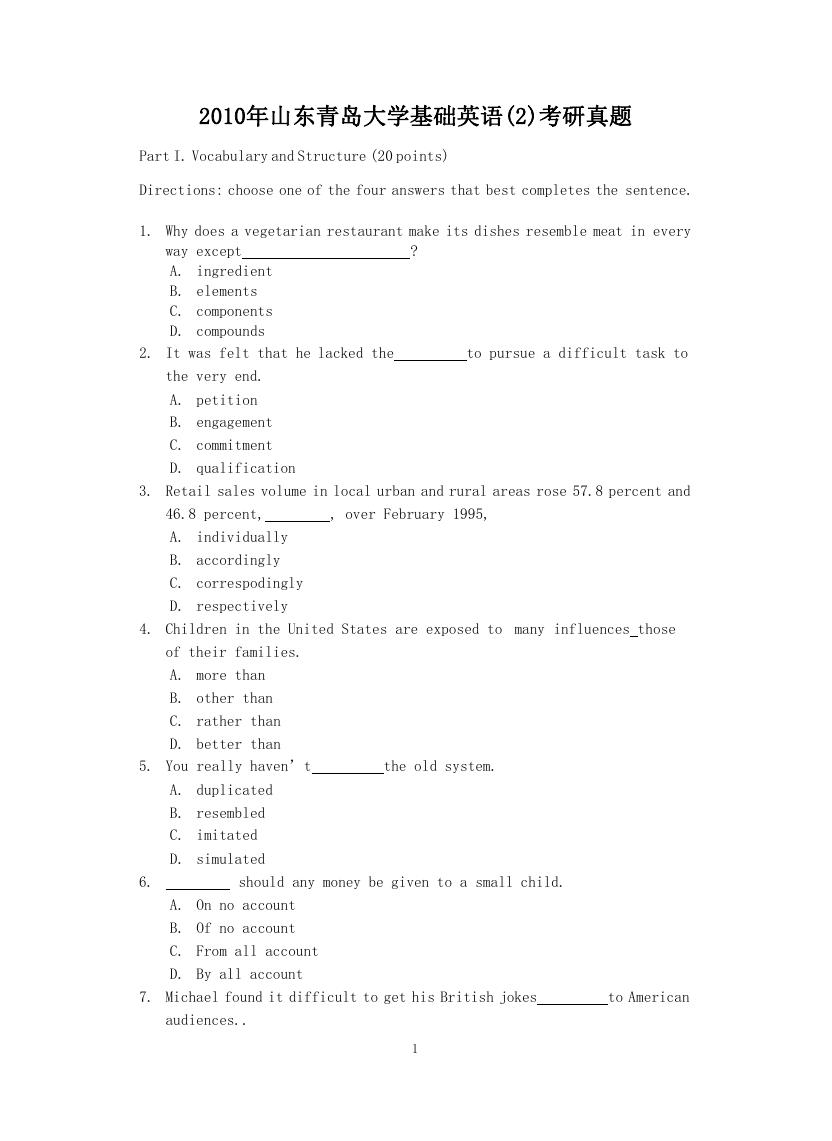
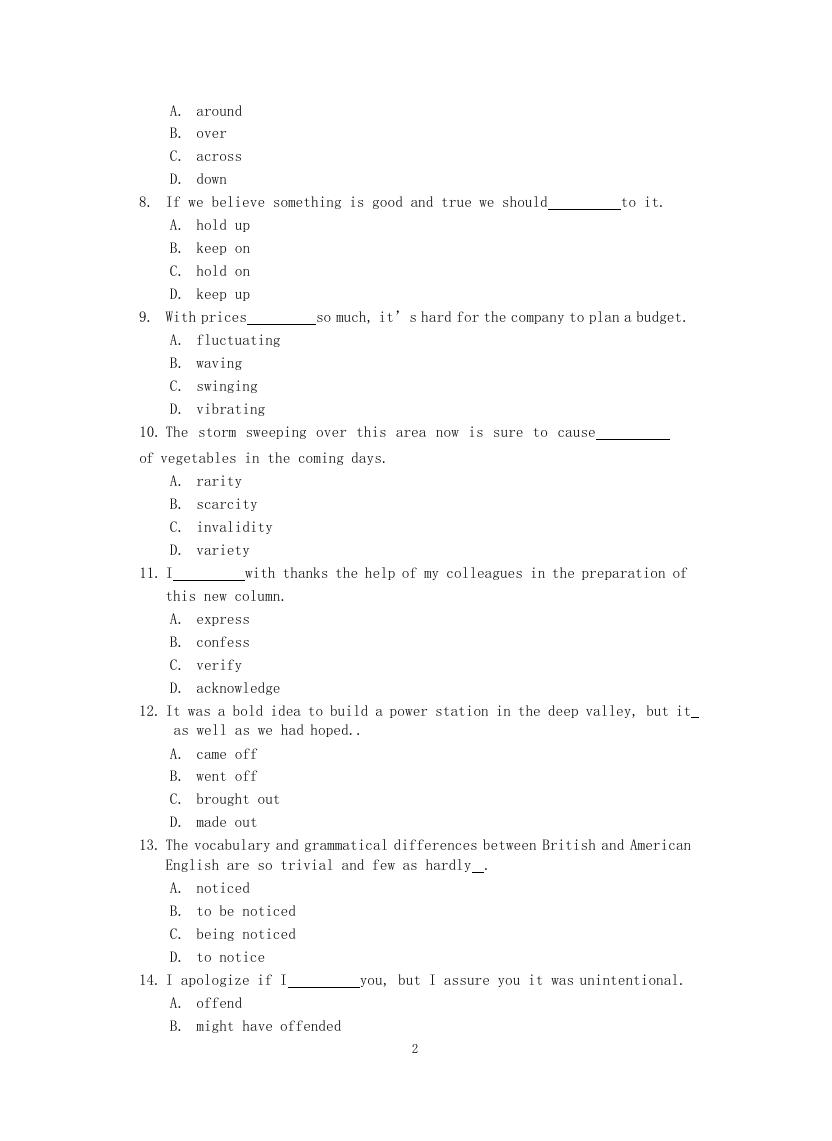
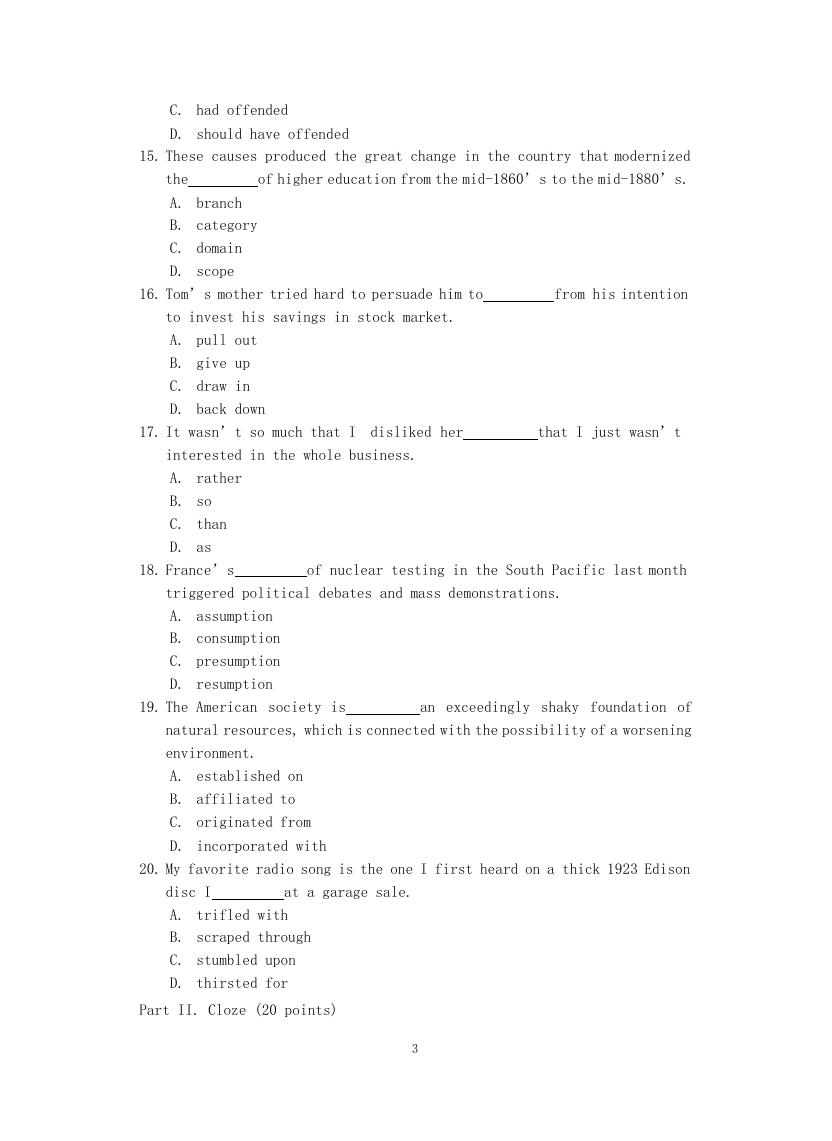
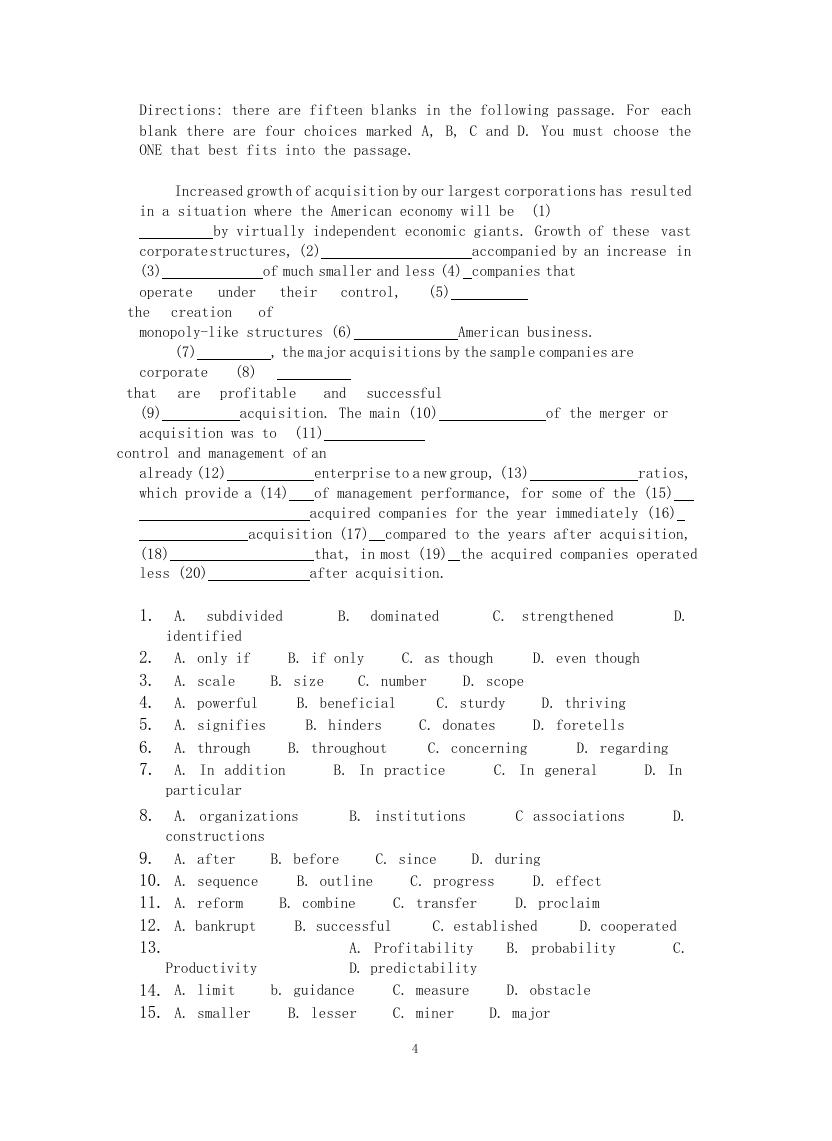
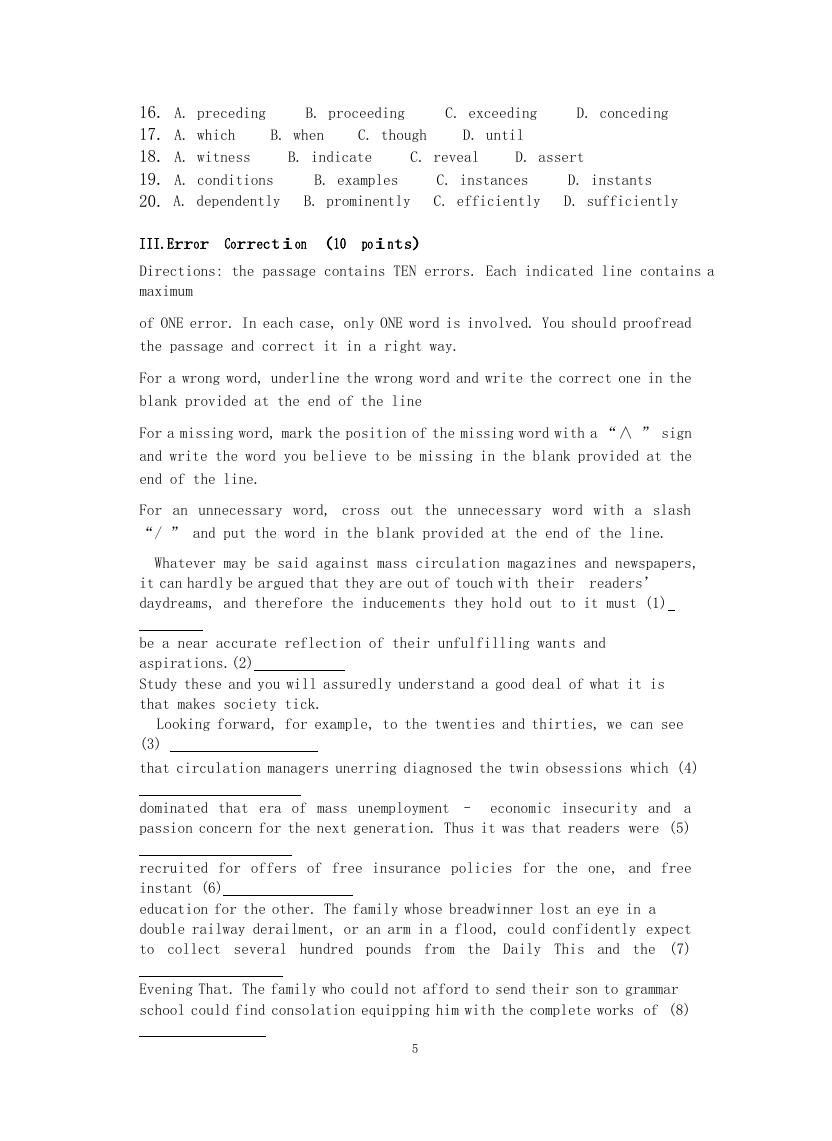
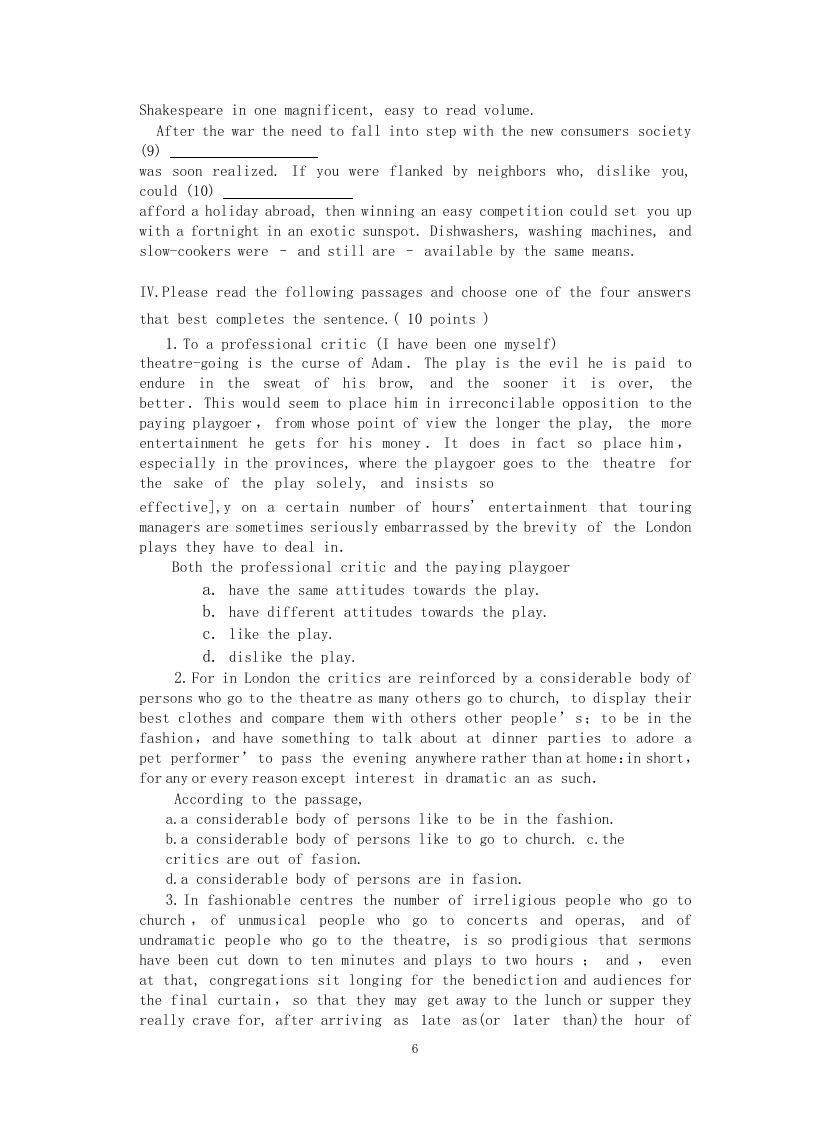
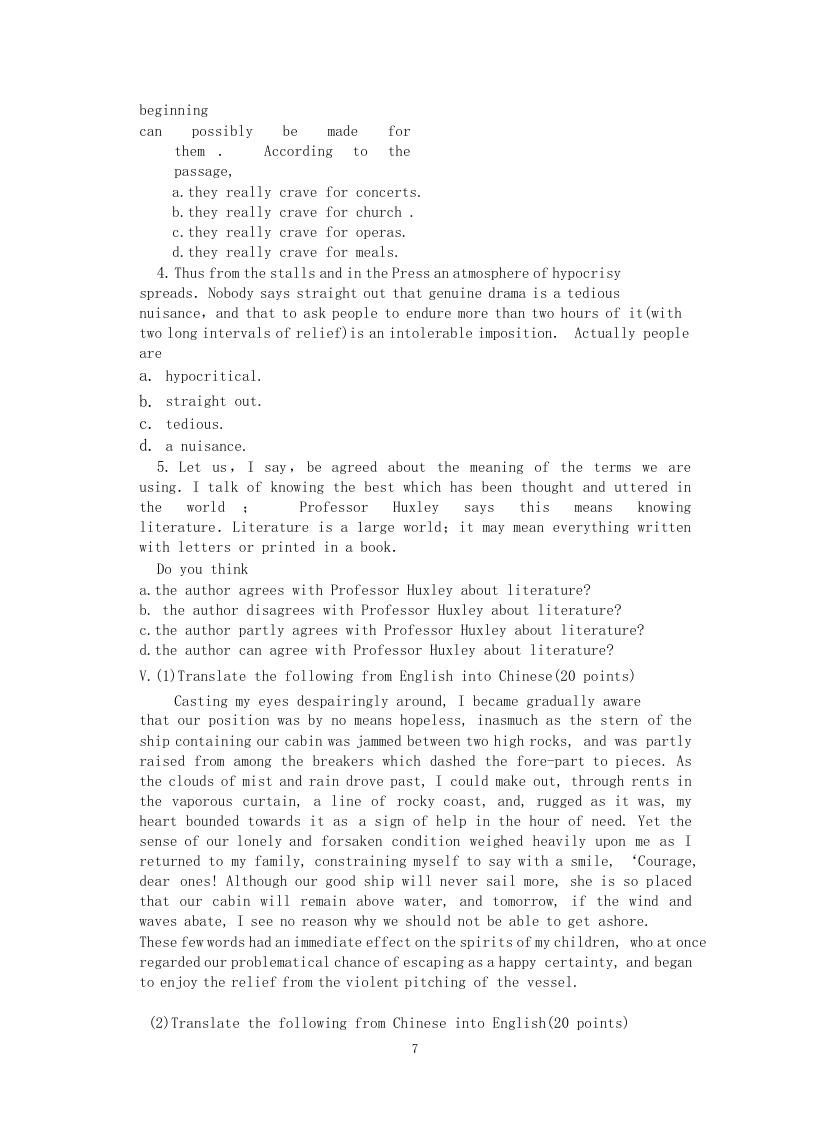
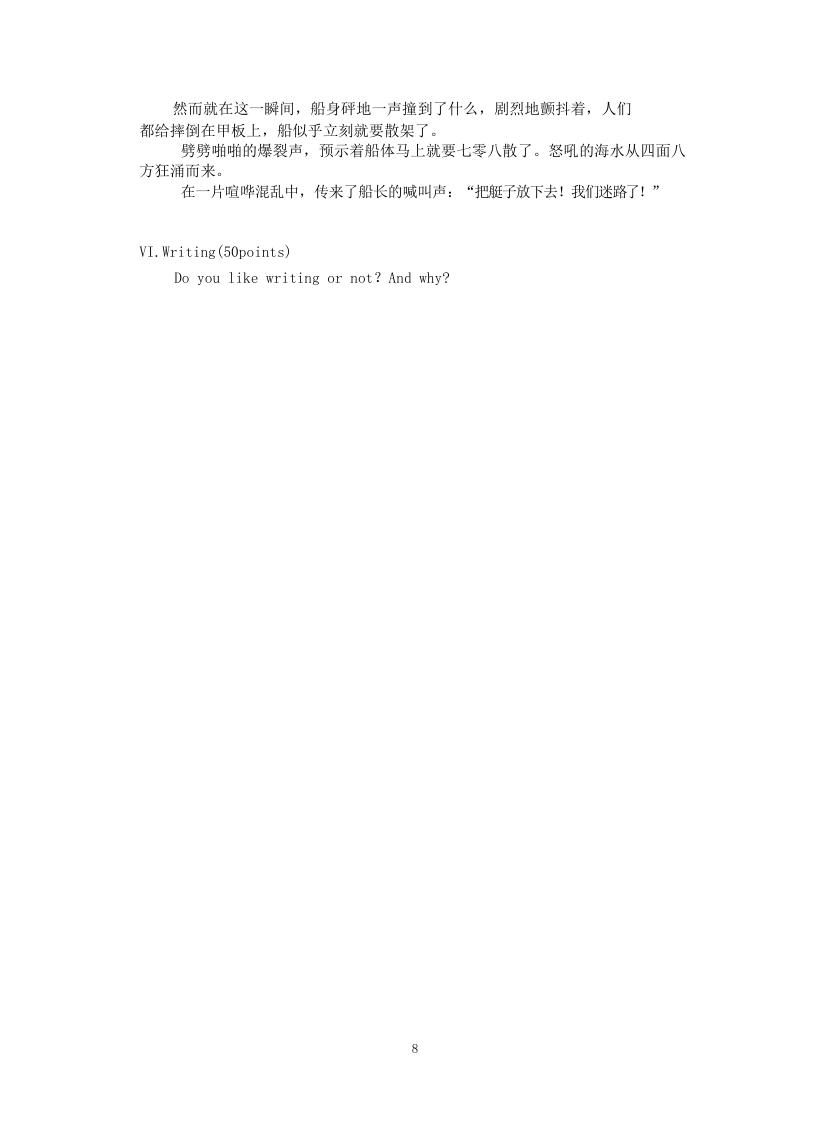








 2023年江西萍乡中考道德与法治真题及答案.doc
2023年江西萍乡中考道德与法治真题及答案.doc 2012年重庆南川中考生物真题及答案.doc
2012年重庆南川中考生物真题及答案.doc 2013年江西师范大学地理学综合及文艺理论基础考研真题.doc
2013年江西师范大学地理学综合及文艺理论基础考研真题.doc 2020年四川甘孜小升初语文真题及答案I卷.doc
2020年四川甘孜小升初语文真题及答案I卷.doc 2020年注册岩土工程师专业基础考试真题及答案.doc
2020年注册岩土工程师专业基础考试真题及答案.doc 2023-2024学年福建省厦门市九年级上学期数学月考试题及答案.doc
2023-2024学年福建省厦门市九年级上学期数学月考试题及答案.doc 2021-2022学年辽宁省沈阳市大东区九年级上学期语文期末试题及答案.doc
2021-2022学年辽宁省沈阳市大东区九年级上学期语文期末试题及答案.doc 2022-2023学年北京东城区初三第一学期物理期末试卷及答案.doc
2022-2023学年北京东城区初三第一学期物理期末试卷及答案.doc 2018上半年江西教师资格初中地理学科知识与教学能力真题及答案.doc
2018上半年江西教师资格初中地理学科知识与教学能力真题及答案.doc 2012年河北国家公务员申论考试真题及答案-省级.doc
2012年河北国家公务员申论考试真题及答案-省级.doc 2020-2021学年江苏省扬州市江都区邵樊片九年级上学期数学第一次质量检测试题及答案.doc
2020-2021学年江苏省扬州市江都区邵樊片九年级上学期数学第一次质量检测试题及答案.doc 2022下半年黑龙江教师资格证中学综合素质真题及答案.doc
2022下半年黑龙江教师资格证中学综合素质真题及答案.doc